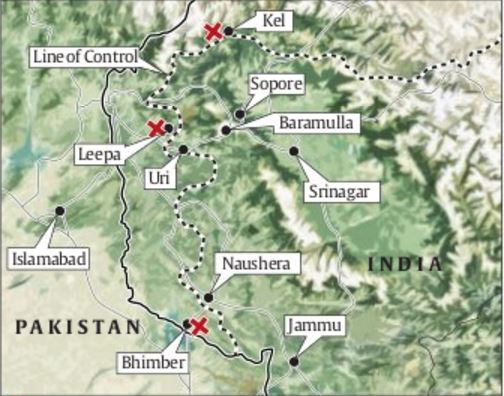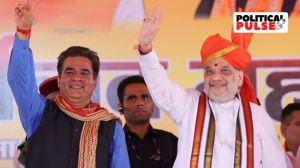- India
- International
Night after surgical strikes: Indian jawan in Pak custody, LoC firefight continues
The fighting, sources told The Indian Express, was spearheaded by jihadists sent in to retaliate against the raids, backed by Pakistani troops stationed across the Line of Control near Tata Pani.
 Where Pakistan said there was firing
Where Pakistan said there was firing
Fresh fighting has erupted along the southern stretches of the Line of Control with Indian forces engaging terrorists in the village of Mankote, close to the location of some of the most intense combat in Thursday’s pre-dawn special forces raids on jihadist staging posts.
The fighting, sources told The Indian Express, was spearheaded by jihadists sent in to retaliate against the raids, backed by Pakistani troops stationed across the Line of Control near Tata Pani.
WATCH VIDEO: India’s Surgical Strike: Beyond What The Govt Said
Chandu Babulal Chauhan, a soldier serving with the 37 Rashtriya Rifles, was captured after he “inadvertently crossed over to the other side of the Line of Control”, an Indian Army official said.
Islamabad-based diplomatic sources, however, told The Indian Express that Chauhan had been captured by Pakistani troops at Jhandroot, west of Mankote, and was now being kept at the military headquarters in Nikayal.

Eight Indian soldiers, Pakistani media reported, citing their army sources, had been killed in the second burst of fighting on Thursday near Tata Pani, a claim the Indian Army said was “completely false and baseless”.
Fears have been mounting that Thursday’s fighting could lead to a meltdown of the long-standing ceasefire on Line of Control in a year that has until now been the most peaceful in a decade. Government figures obtained by The Indian Express show there were just 21 exchanges of fire on the LoC until Thursday, down from 222 in 2015, 190 in 2014 and 229 in 2013. Fatalities in these clashes had dropped to zero, from nine army personnel and 16 civilians last year.
WATCH VIDEO: Night After Surgical Strikes: PM Narendra Modi To Review Situation
“The quiet on the Line of Control has helped us contain infiltration amidst the awful situation inside the Kashmir valley, since its easier to maintain our defences”, a senior military officer at the Srinagar-based XV corps said. “Pakistan has an obvious interest in stepping up the heat”.
Government sources said the area around Mankote and Mendhar saw some of the most fierce fighting on Thursday with an Indian assault claiming the lives of at least two Pakistani soldiers. The fighting was centred around Roshni Post, from where Indian special forces were providing heavy fire support as they targeted rural safe-houses and military forward posts ued to support infiltration.
Troops have been since been pushed forward to guard against Pak retaliation, sources said, while civilians were being evacuated out of a 2-km buffer zone. Local residents said they saw the forward movement of artillery on Thursday.
WATCH VIDEO: Night After Surgical Strikes: PM Narendra Modi To Review Situation
Since 1989, troops on both sides of the Line of Control have been locked in a secret faceoff, which Thursday’s raids have brought out of the shadows. The Indian Government’s decision, meant to signal to Pakistan that it is no longer willing to tolerate cross-border infiltration, could set a new norm for action across the Line of Control by both militaries, experts have said.
The two countries had agreed to a ceasefire along the Line of Control in 2003, following the India-Pakistan military crisis that followed the Jaish-e-Muhammad’s attack on Parliament House. Efforts to sign a formal agreement, though, collapsed in 2006, amid disputes over the rules governing the construction of new defensive fortifications.
In January 2013, the ceasefire frayed after jihadists beheaded Lance-Naik Hem Raj and Lance-Naik Sudhakar Naik, with the Opposition calling for retaliation in kind.
The fighting had its genesis in events the previous October, when disputes over defensive fortifications in Uri led both sides to trade fire.
Following a series of bloody clashes, the Directors-General of Military Operations of the two countries met to cool down tensions, though skirmishes continued through the winter.
Long before the dispute over border construction, though, several similar cross-border clashes had taken place. In March 1998, an Indian special forces unit is alleged to have killed 22 in Bandala in the Chhamb sector. The Pak military claimed to have recovered an Indian-made watch from the scene of the carnage, along with a hand-written note which asked, “How does your own blood feel?”
The Bandala massacre is alleged to have been carried to avenge the massacre of 29 villagers at Prankote, in Jammu and Kashmir, by the Lashkar-e-Taiba.The Lashkar attackers slit the throats of their victims, which included women and infants.
Large-scale civilian killings did not take place again, but the Indian army continued to dish out at least as good as it got. In May 1999, as the Kargil war broke out, Captain Saurabh Kalia, along with sepoys Bhanwar Lal Bagaria, Arjun Ram, Bhika Ram, Moola Ram and Naresh Singh, were kidnapped by Pak troops. Post mortem revealed that the men’s bodies had been mutilated and burned with cigarette-ends.
Late in January, 2000, seven Pak soldiers were alleged to have been captured in a raid on a post in the Nadala enclave, across the Neelam River. The seven soldiers were allegedly tied up and dragged across a ravine running across the LoC. The bodies were returned, according to Pakistan, bearing signs of torture.
There have been a string of smaller incidents since the ceasefire went into force. In June 2008, Pak troops attacked the Kranti border observation post near Salhotri village in Poonch, killing 2-8 Gurkha Regiment soldiers in Jawashwar Chhame. Pak officials allege Indian troops retaliated by beheading a soldier and carrying his head across on June 19, 2008, in the Bhattal sector in Poonch. Finally on August 30, 2011, Pakistan complained that three soldiers, including a JCO, were beheaded in an Indian raid on a post in the Sharda sector, across the Neelam river valley in Kel — retaliation for the decapitation of two Indian soldiers near Karnah.
Apr 26: Latest News
- 0118 hours ago
- 0220 hours ago
- 037 hours ago
- 0420 hours ago
- 0520 hours ago







































